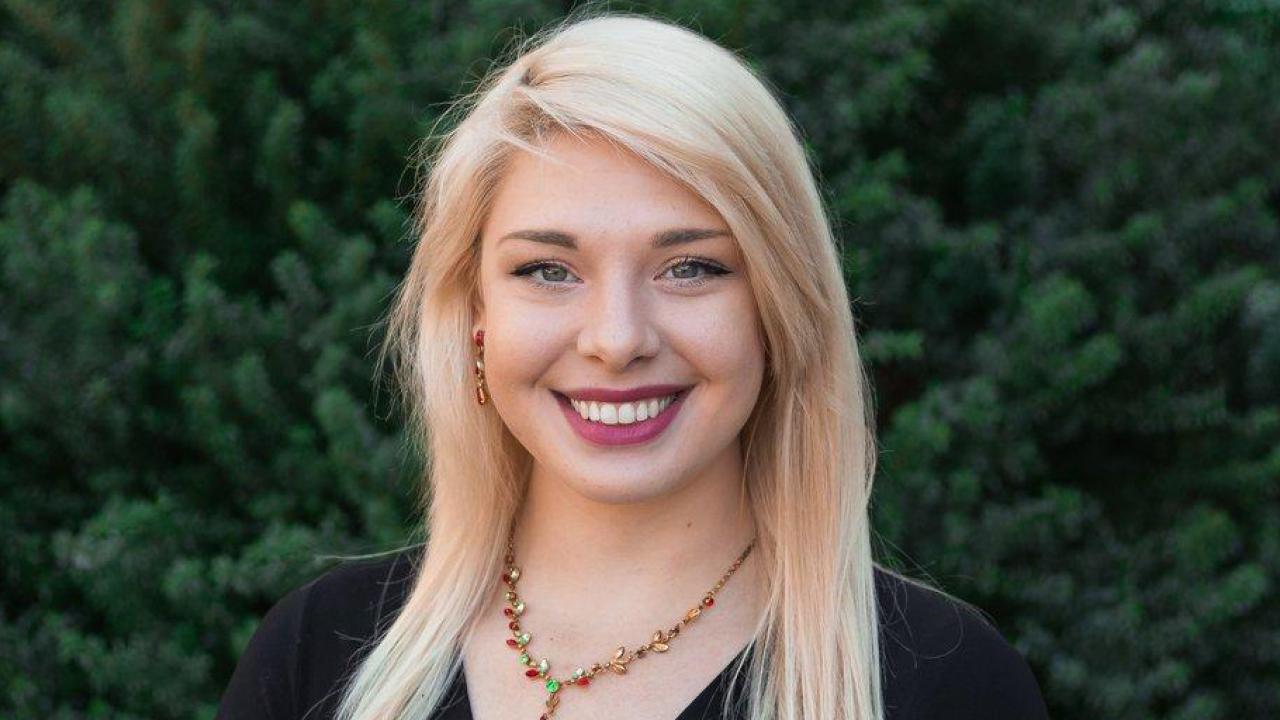
Ph.D. student Leslie Simms selected to attend Lindau Nobel Laureate Meeting
Second-year mechanical and aerospace engineering Ph.D. student Leslie Allyn Simms was selected to attend the 70th annual Lindau Nobel Laureate meeting from June 27 – July 2, 2021 in Lindau, Germany.
The Lindau Nobel Laureate meeting is an annual gathering of Nobel Prize winners and top young scientists from around the world. It is a once-in-a-lifetime chance for up-and-coming researchers to meet and exchange ideas with leaders in medicine, chemistry, physics and literature while attending lectures, panel discussions and small-group meetings. Due to travel restrictions this year, attendees will have an online meet-and-greet in June 2020 and attend the meeting in person in 2021.
Simms, along with her UC Davis colleague Tomas Gonzalez-Fernandez in biomedical engineering, are among 660 young scientists from 101 countries selected to attend and are part of the UC Office of the President’s inaugural class of Lindau Nobel Laureate Meeting Fellows.
“Hard work really does pay off,” said Simms. “I feel extraordinarily privileged to be selected because meeting Nobel Prize winners in fields like chemistry and medicine will be very valuable to my highly interdisciplinary research group. I am also grateful as a woman scientist to one day make an impact and inspire the next generation of women to achieve anything they set their mind to.”
Simms, part of professor Cristina Davis’ lab, work to create small devices that detect chemicals in the air and in liquid. These devices can be used for anything from veterinary medicine to agriculture, though her focus is on the environment and medical applications.
She deployed sampling devices in Davis during the Camp Fire in 2018 and on a drone during experimental fires to analyze the chemicals in the air coming from the smoke. The device gave her a complete chemical profile of the air over time, which can be used to create more localized air quality measurements. She hopes these chemical readings can help scientists understand the effects of fires on public health and the environment. This information can lead to better wildfire protocols and earlier evacuations, saving more lives—similar to the hurricane warning systems in her home state of Florida.
“In Florida, the community and public officials are very invested in the state of a hurricane. Shelters, evacuations, food and supplies shipments and news updates are taken very seriously,” she explained. “During a natural disaster, it’s important that the public has a strong reflex-like reaction and engage in a common protocol together. Hopefully my work will help strengthen that protocol and better inform the people on how a fire is progressing.”
In the next few years, she plans to pivot her research toward tissue fabrication and use these same devices to detect chemicals during the process of printing 3D organs. Detecting these chemicals is a non-invasive way to know whether the organ is functioning properly and will be accepted by a patient.
Simms eventually wants to work in academia and run her own lab to pay forward the supportive environment Davis has given her throughout her graduate school career.
“Finding both the work that you love and the people you love working with is so important and what pushes a good scientist to become great,” she said. “I am so thankful for the supportive, hardworking and inspiring people in my laboratory. There really is a different kind of data you work with when you love what you’re doing.”
Read the UCOP press release to learn more.
About Graduate Studies
Graduate Studies at UC Davis includes over 100 dynamic degree programs and a diverse and interactive student body from around the world. Known for our state-of-the-art research facilities, productive laboratories and progressive spirit – UC Davis offers collaborative and interdisciplinary curricula through graduate groups and designated emphasis options, bringing students and faculty of different academic disciplines together to address real-world challenges.
UC Davis graduate students and postdoctoral scholars become leaders in their fields: researchers, teachers, politicians, mentors and entrepreneurs. They go on to guide, define and impact change within our global community.
For information on Graduate Studies’ current strategic initiatives, visit the Graduate Studies strategic plan page.
